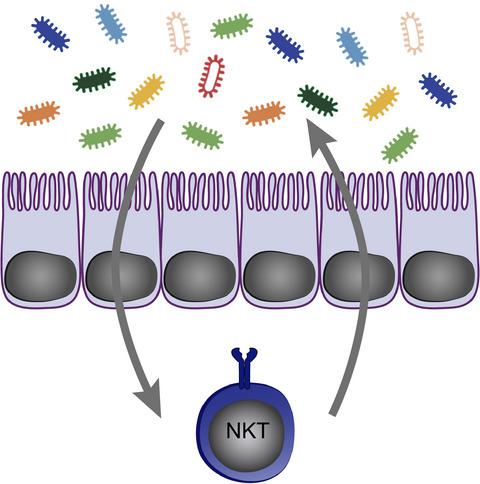Our official English website, www.x-mol.net, welcomes your feedback! (Note: you will need to create a separate account there.)
NKT cells and the regulation of intestinal immunity: a two-way street.
The FEBS Journal ( IF 5.5 ) Pub Date : 2020-02-21 , DOI: 10.1111/febs.15238 Phillip M Brailey 1, 2 , Marta Lebrusant-Fernandez 1, 2 , Patricia Barral 1, 2
The FEBS Journal ( IF 5.5 ) Pub Date : 2020-02-21 , DOI: 10.1111/febs.15238 Phillip M Brailey 1, 2 , Marta Lebrusant-Fernandez 1, 2 , Patricia Barral 1, 2
Affiliation

|
The mammalian gastrointestinal compartment is colonised by millions of microorganisms that have a central influence on human health. Intestinal homeostasis requires a continuous dialogue between the commensal bacteria and intestinal immune cells. While interactions between host and commensal bacteria are normally beneficial, allowing training and functional tuning of immune cells, dysregulated immune system-microbiota crosstalk can favour the development of chronic inflammatory diseases, as it is the case for inflammatory bowel disease (IBD). Natural killer T (NKT) cells, which recognise CD1-restricted microbial and self-lipids, contribute to the regulation of mucosal immunity by controlling intestinal homeostasis and participating in the development of IBD. Here, we provide an overview of the recently identified pathways underlying the crosstalk between commensal bacteria and NKT cells and discuss the effect of these interactions in intestinal health and disease.
中文翻译:

NKT 细胞和肠道免疫的调节:一条两条路。
哺乳动物的胃肠腔内栖息着数百万对人类健康具有重要影响的微生物。肠道稳态需要共生细菌和肠道免疫细胞之间的持续对话。虽然宿主和共生细菌之间的相互作用通常是有益的,可以训练和调节免疫细胞的功能,但失调的免疫系统-微生物群串扰可能有利于慢性炎症性疾病的发展,例如炎症性肠病 (IBD)。识别 CD1 限制性微生物和自身脂质的自然杀伤 T (NKT) 细胞通过控制肠道稳态和参与 IBD 的发展来调节粘膜免疫。这里,
更新日期:2020-02-21
中文翻译:

NKT 细胞和肠道免疫的调节:一条两条路。
哺乳动物的胃肠腔内栖息着数百万对人类健康具有重要影响的微生物。肠道稳态需要共生细菌和肠道免疫细胞之间的持续对话。虽然宿主和共生细菌之间的相互作用通常是有益的,可以训练和调节免疫细胞的功能,但失调的免疫系统-微生物群串扰可能有利于慢性炎症性疾病的发展,例如炎症性肠病 (IBD)。识别 CD1 限制性微生物和自身脂质的自然杀伤 T (NKT) 细胞通过控制肠道稳态和参与 IBD 的发展来调节粘膜免疫。这里,










































 京公网安备 11010802027423号
京公网安备 11010802027423号